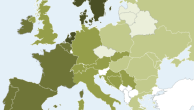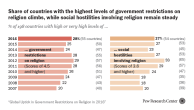On environmentalism and homosexuality, Orthodox Christians are largely united in their views. Most Eastern Orthodox Christians – whose spiritual leader, Ecumenical Patriarch Bartholomew, has been called the “Green Patriarch” – favor environmental protection, even at the expense of economic growth. And the vast majority of Orthodox Christians say homosexuality should be discouraged by society, though those in Greece and the U.S. are exceptions to this broad pattern.
On other issues, Orthodox Christians are divided. When it comes to whether abortion should be legal, for instance, there are mixed views in many countries surveyed, with those in former Soviet republics expressing more opposition to legal abortion than those elsewhere.
Orthodox Christians in Ethiopia are especially conservative on social issues. In answers to a series of questions on the morality of specific behaviors, Ethiopian Orthodox Christians are more likely than Orthodox Christians in most other countries surveyed to express moral opposition to abortion, divorce and drinking alcohol.
This chapter explores Orthodox Christians’ views on a range of social and political issues, including human evolution and gender roles and norms. While not all questions asked of Orthodox Christians in Central and Eastern Europe (where the vast majority of Orthodox Christians live) were also asked of their co-religionists in the U.S. and Ethiopia, the chapter includes cross-regional comparisons whenever possible.
Orthodox Christians largely reject homosexuality and oppose same-sex marriage
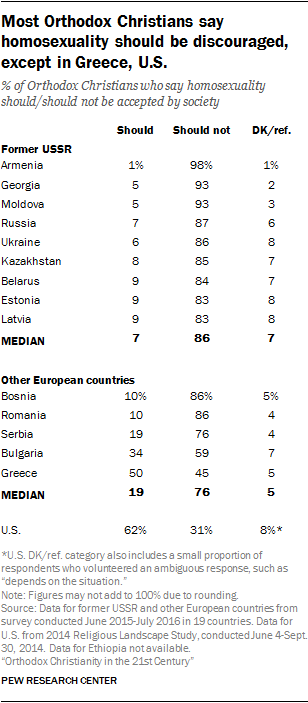
The vast majority of Orthodox Christians across Eastern Europe say homosexuality should not be accepted by society. This includes virtually all in Armenia (98%), and more than eight-in-ten in Russia (87%) and Ukraine (86%), which have the region’s largest Orthodox populations. Overall, Orthodox Christians in former Soviet republics are less accepting of homosexuality than are those elsewhere in Eastern Europe.
Two exceptions to Orthodox Christians’ overall rejection of homosexuality are in Greece and the United States. Fully half of Orthodox Christians in Greece say society should accept homosexuality, as do a clear majority (62%) of Orthodox Christians in the United States.
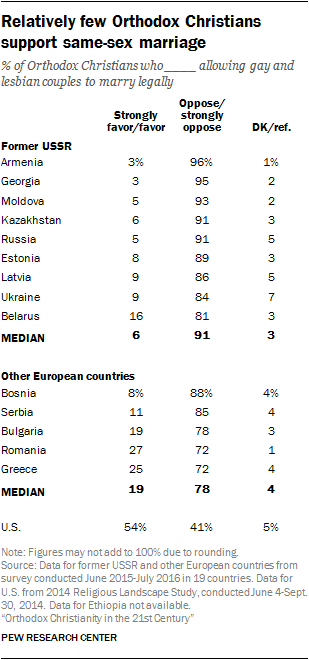
Similarly, very few Orthodox Christians in Eastern Europe say same-sex marriage should be legal. Even in Greece, where half of Orthodox Christians say society should accept homosexuality, only a quarter (25%) say gay and lesbian couples should be able to marry legally.
Same-sex marriage is not currently legal in any Eastern European country (although Greece and Estonia allow same-sex domestic partnerships or civil unions), and no Orthodox church sanctions same-sex weddings.
The United States, however, allows same-sex marriage nationwide. There, Orthodox Christians are more accepting of the practice; more than half (54% as of 2014) favor allowing gay and lesbian couples to marry legally, almost mirroring the share of American adults overall who took this position in 2014 (53%).
Mixed views among Orthodox Christians over abortion as a legal issue
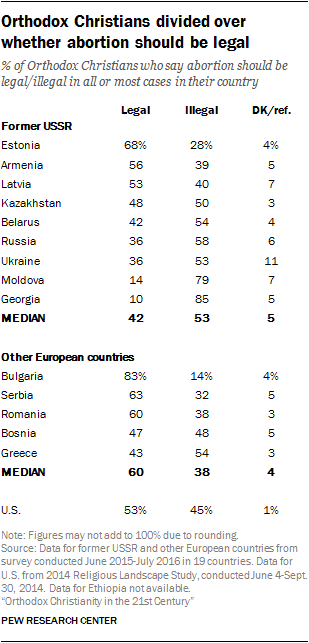
Compared with homosexuality, there is less of a consensus among Orthodox Christians about whether abortion should be legal. In some countries, such as Bulgaria and Estonia, solid majorities of Orthodox Christians say abortion should be legal in all or most cases. But in Georgia and Moldova, majorities of Orthodox Christians take the opposite position: that abortion should be illegal in all or most cases. In Russia, too, most Orthodox Christians (58%) say abortion should be mostly or entirely illegal.
Abortion is currently legal in many situations in Russia, across most of Eastern Europe and in the United States.
As is true for homosexuality and same-sex marriage, Orthodox Christians in former Soviet republics are somewhat more conservative on the legality of abortion than are other Orthodox Christians in Eastern Europe. A median of 42% of Orthodox Christians in the nine post-Soviet states surveyed say abortion should be legal in all or most cases, compared with a median of 60% in the five other European countries surveyed.
Orthodox Christians see homosexual behavior, prostitution as morally wrong
While more recent surveys did not ask Orthodox Ethiopians about homosexuality, same-sex marriage or abortion, a 2008 Pew Research Center survey did ask this group about the morality of “homosexual behavior,” of “having an abortion,” and other behaviors. (It is possible opinions could have shifted since this survey was conducted.)
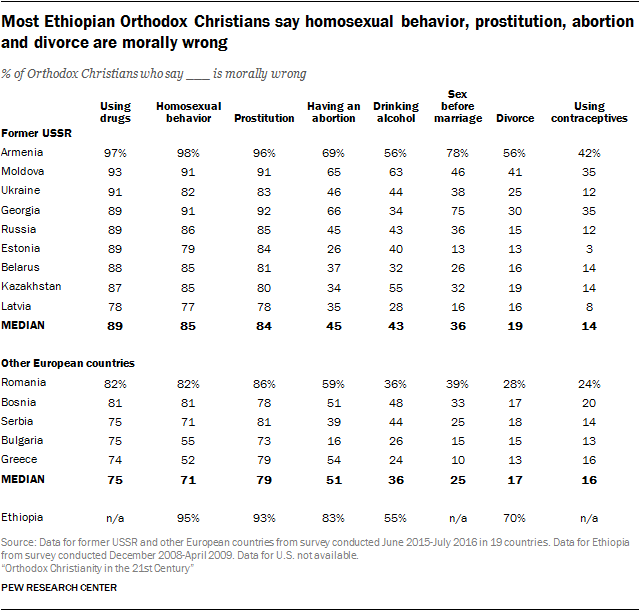
In 2008, nearly all Orthodox Christians in Ethiopia (95%) said “homosexual behavior” is morally wrong, while the vast majority (83%) also said this about having an abortion. Orthodox Christians in Ethiopia also tended to see prostitution (93%), divorce (70%) and drinking alcohol (55%) as morally wrong.
Orthodox Christians in Ethiopia are more likely than those in most Eastern European countries to raise moral objections to several of these behaviors, although Orthodox Christians in Eastern Europe – both in former Soviet republics and elsewhere – also widely see homosexual behavior and prostitution as morally wrong. U.S. Orthodox Christians were not asked about the morality of these behaviors.
Protecting environment more important than economic growth, Orthodox Christians say
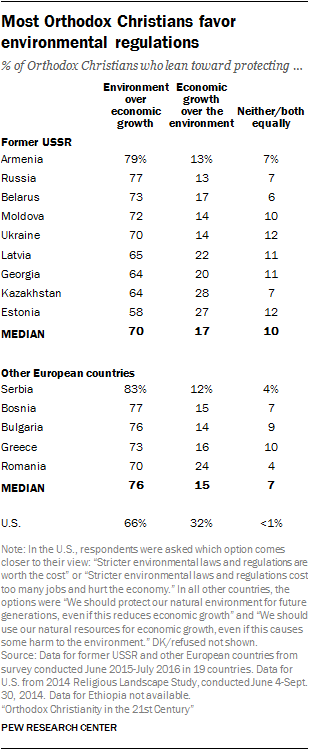
Patriarch Bartholomew I of Constantinople, considered by some to be the spiritual leader of the world’s Eastern Orthodox Christians, has been called the “Green Patriarch” for his environmental activism.
Most Orthodox Christians share the view that the environment should be protected even at the expense of economic growth. Orthodox majorities in every Eastern European country surveyed agree with the statement, “We should protect our natural environment for future generations, even if this reduces economic growth.” In Russia, Orthodox Christians are more likely than the religiously unaffiliated to take this position (77% vs. 60%), although there are not always significant differences between Orthodox Christians and members of other religious groups within countries.
Orthodox Christians in post-Soviet states and those in other European countries have largely similar views on this topic. Orthodox Christians in the U.S. were asked a somewhat different question, but, again, most (66%) say that stricter environmental laws and regulations are worth the cost.
Orthodox Christians tend to believe in human evolution
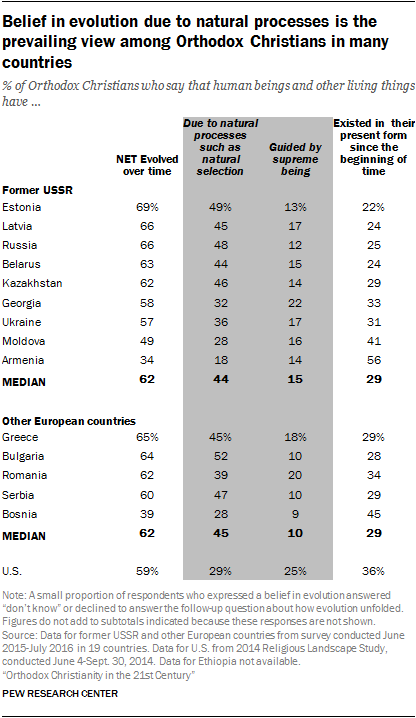
Most Orthodox Christians believe that humans and other living things have evolved over time, although considerable shares in many countries reject the theory of evolution, saying instead that humans and other organisms have existed in their present form since the beginning of time.
Majorities of Orthodox Christians in most Eastern European countries surveyed say humans have evolved over time, and among those who take this view, the prevailing opinion is that evolution occurred due to natural processes such as natural selection (rather than being guided by a supreme being).
In the U.S., about six-in-ten Orthodox Christians (59%) believe in evolution, although they are more evenly divided between those who favor evolution due to natural selection (29%) and those who say evolution was guided by a supreme being (25%). About a third of U.S. Orthodox Christians (36%) reject evolution, similar to the share of Americans overall who say this (34%).
Many Orthodox Christians in Europe say women have a responsibility to society to bear children, although fewer favor traditional gender roles in marriage
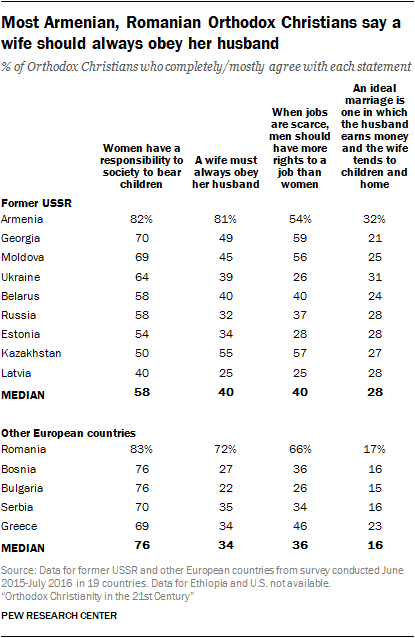
Across Eastern Europe, most Orthodox Christians say that women have a responsibility to society to bear children, although Orthodox Christians in the former Soviet republics are somewhat less likely than those in other European countries to hold this view.
Fewer Orthodox Christians in the region – although still substantial shares in most countries – say that a wife must always obey her husband, or that when jobs are scarce, men should have more rights to a job than women. And still fewer say that an ideal marriage is one in which the husband earns money and the wife tends to the children and the home.
Overall, Orthodox Christians in Romania tend to have more traditional views on gender roles than do Orthodox Christians elsewhere in Eastern Europe: Roughly two-thirds or more say that women owe it to society to bear children, that wives should obey husbands and that men should have more rights to a job than women in times of high unemployment.
Although U.S. Orthodox Christians were not asked these questions, most (70%) say, in response to a different question, that having more women in the workforce has been a positive change for American society.
On balance, Orthodox women are more supportive of women’s rights than are Orthodox men. In most countries, women are less likely than men to agree that a wife is obligated to obey her husband. And in several countries, women are less likely than men to agree that men have greater employment rights than women, especially when jobs are scarce.
But women are not always more supportive of liberal positions regarding gender roles. In the majority of countries surveyed, women are about as likely as men to agree that they have a social responsibility to bear children. They also are as likely as men to agree that a traditional marriage, where women are primarily in charge of household tasks while men earn money, is ideal.


